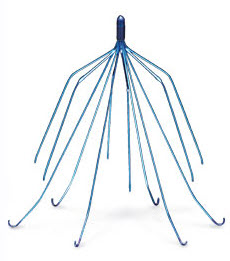The lawsuit was filed by Billy J. S., a man who was implanted with the C.R. Bard Recovery® Vena Cava Filter on January 9, 2007 at a hospital in Alabama.
Recovery was implanted in his body two years after it was pulled off the market without a recall. No safety warnings were ever issued, so doctors and patients had no idea it was linked to high rates of fracture.

Bard Recovery® IVC Filter
Recovery has now been linked to the highest fracture-rate of any IVC filter. In 2012, a study of 363 patients estimated a 40% 5.5-year fracture-rate. One filter fractured in 4 months. In 8 cases, broken parts of the filter traveled to the lungs, heart, kidneys, or iliac/femoral veins.
Fractures occur when the metal legs of an IVC filter wear out and snap off due to near-constant flexing movements in the body. It is an extremely dangerous complication that can cause sudden death.
IVC filters are implanted in the inferior vena cava, which is the largest vein in the body. This vein is constantly pulsating with blood pressure, heartbeats, and breathing. IVC filters must also be able to withstand constant flexing — because if they break, fractured pieces can be carried in the bloodstream and go straight to the heart.
These side effects were a big reason why IVC filters were rarely used until 2003, when the FDA approved the first “short-term” IVC filters.
C.R. Bard raced to get the Recovery approved in 2003. It did not go through clinical trials because the company claimed it was equivalent to “permanent” IVC filters, except for a hook to facilitate retrieval.
In 2004, C.R. Bard’s own internal studies showed that Recovery had higher rates of fractures and migration than other IVC filters. This study was not released for many years. In 2005, Bard replaced the Recovery with a near-identical 2nd-generation IVC filter called the G2.
Not surprisingly, G2 was soon linked to high rates of fracture and migration. In 2014, a study estimated that 38% of G2 filters would fracture within 5 years — a nearly-identical risk as the Recovery.
C.R. Bard is accused of selling defective medical devices, downplaying long-term safety risks, and inadequately studying dangerous devices for side effects.
The lawsuit was filed on March 7, 2017 in the U.S. District Court for the District of Arizona — Case No. 2:17-cv-00687.
It will be centralized with around 1,470 other IVC filter lawsuits now pending against C.R. Bard in Multi-District Litigation (MDL No. 2641) — In Re: Bard IVC Filters Products Liability Litigation.
The plaintiff is represented by Ben C. Martin of The Law Offices of Ben C. Martin in Dallas, Texas. He serves on the plaintiffs’ steering committee of the Bard IVC Filter MDL.
 Editor’s note: For more information about IVC Filter lawsuits and your legal rights, please contact The Law Offices of Ben C. Martin.
Editor’s note: For more information about IVC Filter lawsuits and your legal rights, please contact The Law Offices of Ben C. Martin.

